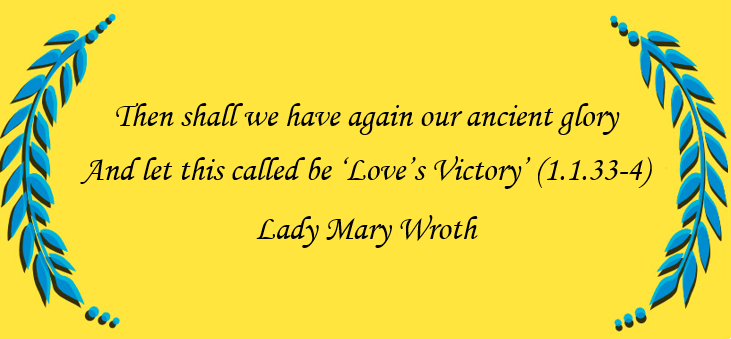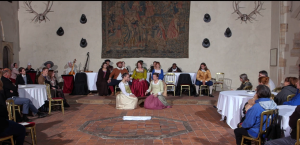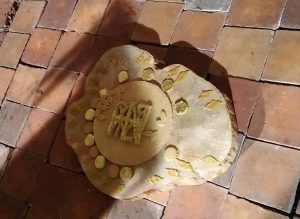


On 27 September 2022
Love’s Victory was successfully staged and filmed at
Penshurst Place, the family home of the author.
The live performance was professionally filmed in order to give members of the public free access to judge and enjoy Love’s Victory in performance. Click here for free access to the film
The production was designed to recreate a mixture of masque and household theatre.

The actors sat at the high table on the dais or raised platform at the end of Baron’s Hall throughout the performance, occupying the positions of prominent members of the Sidney-Herbert household, and stood up to perform as characters in Wroth’s drama.

Who was Mary Wroth, and how was she able to write a play in an age when women were excluded from the professional theatres like Shakespeare’s? You can see a short video about Wroth, her family and an introduction to the production, by Alison Findlay and Philip Sidney.
For more opportunities to compare the female-authored drama with Shakespeare texts on the school curriculum see our Quill Power project.
Paperback copies of Love’s Victory ed. Alison Findlay, Philip Sidney and Michael Brennan, are now available from Revels Plays (Manchester University Press, 2022)
Here is a copy of the Love’s Victory Programme with full details of the professional cast, the creative team and information about the venue and the author. In addition here is a Who’s Who in Love’s Victory for help with the plot and identifying the characters.

Reviews of the Film: ‘This film of Love’s Victory is a coup de theatre. Restoring the play to the place where it was originally performed, and to something like the way it was performed, this performance showcases the vitality of early modern household drama, for which we have so few examples.’ (Mary Ellen Lamb, Southern Illinois University) Read more and add your own review
Please scroll down to read more about the live production, the music and the costumes.
The Coterie Production 27 September at Penshurst Place
While the performers occupied seats at the great table and the place of members of the Sidney-Herbert family, members of the wider audience sat at banqueting tables around Baron’s Hall consuming early modern banquet sweetmeats at Penshurst Place. This culminated with marchpanes on each table, the family’s high table marchpane featuring the cipher on the title page of the Penshurst Manuscript of Love’s Victory, which entwines the initials of Wroth’s fictional characters and those of the Sidney and Herbert families.

Costumes A team of costumiers from across the north of England created masque style costumes inspired by designs by Inigo Jones for the gods Venus and Cupid and early seventeenth-century bodices, doublets, breeches, petticoats, chemises, shirts for the pastoral characters. Colour was used to allude to the Sidney and Herbert family members for whom the play was composed. Blue and gold are the Sidney family colours (worn by brother and sister characters Philisses and Simeana) while mulberry and silver (worn by Lissius) are the colours of Amphilanthus, the fictional avatar of Wroth’s cousin William Herbert.
Music was co-directed by Robin Jeffrey and Tamsin Lewis (Passamezzo). There are no extant scores for the numerous songs in Love’s Victory so Robin and Tamsin used a selection of tunes that Mary Wroth and her musical family would have known from their own playing, dancing and singing. There are tunes by Thomas Campion, Martin Peerson, Philip Rosseter, John Dowland, Guillaume Tessier and Robert Jones (who dedicated books of airs to Wroth and her father Robert Sidney). For the final song, which is missing from the Penshurst Manuscript, Alison chose ‘Who can blame me if i love? the final song in Book I of Wroth’s Urania I (1621) which Robin and Tamsin set to ‘Durrants Masque,’ an anonymous tune whose title refers to the impressive family seat of the Wroths, where Mary and her husband Robert entertained.
Watch interviews with the cast to hear their views on performing the play, and visit the Rehearsals area for further details of how we went about rehearsing for the play, including open dress rehearsals at Lancaster Castle.
You must be logged in to post a comment.